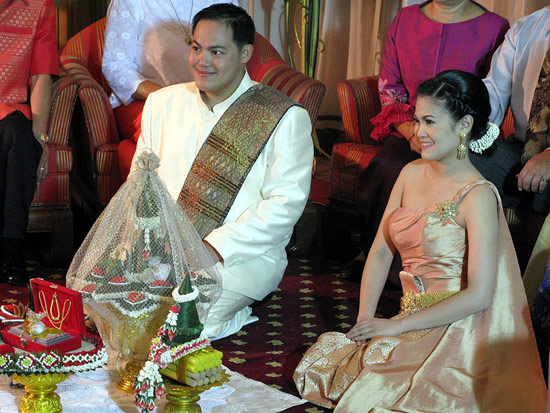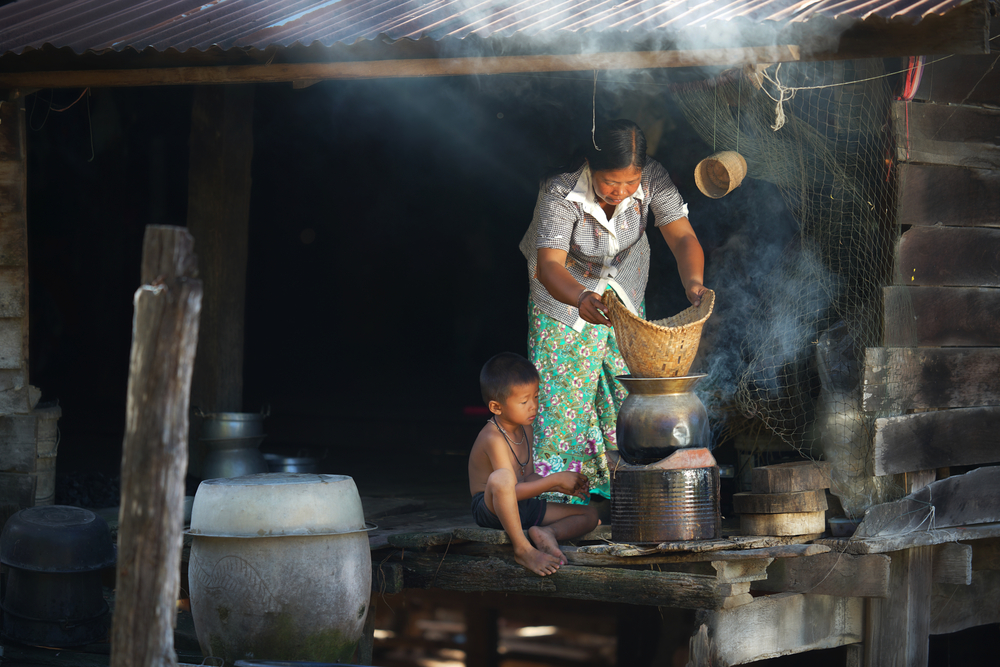Life Stages: Marriage
Thais regard marriage as a spiritual act. Arranging for the marriage of one’s children is an important parental duty, according to Buddhist traditions. Today, however, most Thais choose their own spouse.
Thais must be at least 17 years old to marry legally. Women marry at age 25 on average, while men marry at a few years older. The average marriage age is rising because of migration, increased education, increased participation in the labor force, and a rise in nonagricultural employment. Hierarchy within the family used to be an important indicator of who should marry first, but modern Thais may not observe this order.
The Ceremony
Although a Thai wedding can be done all on one day, it’s more common for the ceremonies and festivities to take place over two or three days. The first part of a wedding is often the soo khor or engagement ceremony, in which the groom makes ceremonial offerings to the bride's parents. The offering usually includes gold jewelry and money, sometimes a substantial sum. It may be performed before the wedding or as part of the same ceremony. Western-style engagements with an exchange of rings are also becoming common in affluent urban families.
Thai weddings can take place anywhere there is an image of the Buddha. There is no prescribed set of vows, and monks need not be present. Specific rituals vary with social and economic standing, region, and ethnicity. It’s traditional, however, to have nine monks present for all the wedding ceremonies. Because of this, Thai weddings cannot take place during the rainy season, when monks customarily have a retreat and stay in their monasteries.
Usually, an astrologer checks if the stars of the prospective couple are compatible and chooses an auspicious date and time for the wedding. On the wedding day, the couple typically goes to the local temple to seek the blessings of the Buddha. They offer candles, flowers, and incense sticks to the image of the Buddha. Family and close friends attend and recite the Vandana (homage), Tisarana (the three refuges), and Pancasila (the five precepts).
Afterward, the most senior monk or a respected guest sprinkles holy waters from a conch shell onto the hands of the couple while the couple hold their hands in an expression of worship, each wearing a circlet made of thread as a symbol of togetherness. The assembly, or sometimes only the parents, recites the Mangala Sutta and Jayamangala Gatha, which are benedictory stanzas in Pali taken from the canonical scriptures.
Gender Roles
Thai society is highly patriarchal, and a man is usually the dominant partner in a marriage. Women are usually fully responsible for the home, even if they work outside the home. Most married couples have their own home or apartment. Sometimes couples live with either set of parents for a short time, but this is almost always a temporary arrangement.
Polygamy was traditionally practiced among the wealthy and in some ethnic tribes in Thailand. Today, it is no longer legally or socially acceptable. A Thai woman is expected to be virtuous, faithful to her husband, and tolerant of his behavior, even if he is not faithful to her. In spite of Buddhist influences, men do not have a parallel virtuous image to live up to. Extramarital affairs are relatively common among men, and wealthy men often keep a mistress.
Divorce
Divorce is legally and socially acceptable in Thailand. Although divorce has come to be regarded as nothing more than a change in living arrangement and division of property, it is associated with a slight degree of stigma among urban middle-class Thais.
When a couple agrees to divorce, they need only live separately and divide marital property before the marriage can be dissolved. Thais can also get a divorce in court on the grounds of adultery, insanity, misconduct, desertion, physical disadvantage, lack of maintenance and support, or a dangerous communicable disease.
People suing for divorce in court can claim maintenance from their spouse. Most Thais prefer to settle child custody, property, and alimony payments through arbitration. In most cases, the court awards custody of children to women.
Although the law demands the payment of a living allowance to the spouse judged to be the innocent party, most divorce cases in Thailand are not contested and are settled out of court. Women are more likely to suffer financially from divorce. Over three-fourths of divorced women in Thailand raise their children without child support payments from their ex-husbands.
Copyright © 1993—2025 World Trade Press. All rights reserved.

 Thailand
Thailand 
